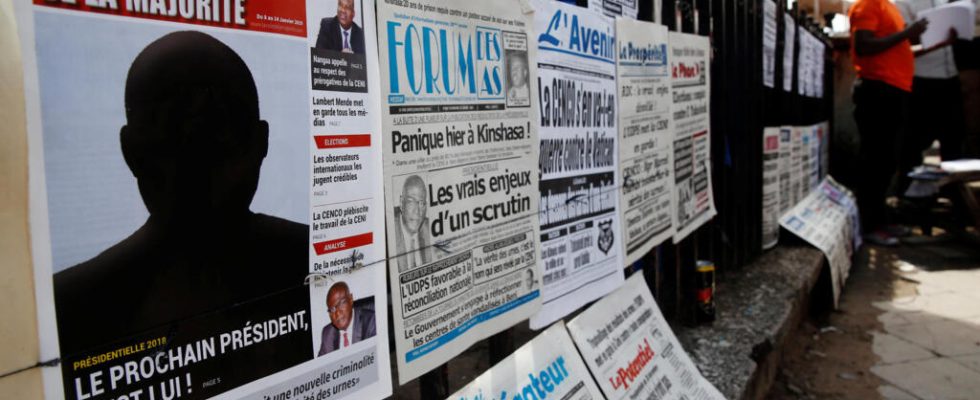On the occasion of the International Day to End Impunity for Crimes Committed against Journalists, a date chosen in memory of Ghislaine Dupont and Claude Verlon, RFI journalists murdered in Mali on November 2, 2013, in the Democratic Republic of Congo, the organization Journalists in Danger (JED) publishes its 2023 annual report and deplores more than 500 attacks on press freedom in five years during the first mandate of Félix Tshisekedi.
Symbolically, a chair remained empty this Thursday, November 2, 2023, in Kinshasa during the Journalists in Danger (JED) press conference. Every year, Stanis Bujakera Tshiamala attended the presentation of the report by the organization defending press freedom. But the magazine correspondent Young Africa and deputy publishing director of the news site Actualite.cd has been detained for almost two months.
Arrested on September 8 at Kinshasa-Ndjili airport, Stanis Bujakera has been in Makala central prison since September 14, accused of “forgery”, “falsification of state seals”, “spreading false rumors”. He was implicated after an article on the Jeune Afrique website published on August 31, signed by the editorial staff. The article mentioned a report attributed to the National Intelligence Agency, the ANR, the authenticity of which Congolese authorities dispute. The document implicates military intelligence in the death of Cherub Okende Sengaformer minister and opposition MP.
DRC: 🇨🇩 “Journalist in danger” deplores “the broken promises” of @PresidentTshis in terms of freedom of the press. More than 500 attacks against the media, including 5 journalists killed, during the mandate. JED publishes its report today.https://t.co/pz0mz0qR0Y
— Sadibou (@Cheikhsadbu) November 2, 2023
Hopes dashed
The detention of Stanis Bujakera is one of 88 attacks on press freedom recorded since the start of 2023 by the JED organization, which counts 523 in total since the start of the mandate of President Félix Tshisekedi. These cases range from the banning of programs, closure of media, to the murder of journalists, including cases of physical violence or verbal threats.
In detail, since 2019, JED recalls that five journalists have been killed in the DRC, more than 130 have been victims of threats or physical violence and 123 media outlets have been attacked, closed or broadcasts banned.
However, the secretary general of JED, Tshivis Tshivuadi, contacted by Magali Lagrangerecalls that after the presidency of Joseph Kabila (2001-2019), the arrival to power of Félix Tshisekedi had raised hope: “ We all had high hopes for this five-year term to open a new era for press freedom after dark years under the long reign of President Joseph Kabila. After the advent of the new president, there was a sort of lull in the first year which was probably due to the fact that the new president came with an opening speech to the media. »
JED recalls, in fact, that President Tshisekedi, newly elected, was committed to making the media “ real fourth estate », to work for respect for fundamental rights, and to raise awareness among security forces about respecting the rights and freedoms of journalists to carry out their information mission without fear of reprisals.
But DIn the years that followed, the situation began to deteriorate so that the level of abuses that we recorded was very high with an average of one hundred various attacks against journalists and the media, including five journalists who were killed during this mandate. And what’s terrible is that there was not the slightest investigation », deplores Tshivis Tshivuadi.
In its 2023 report, JED notes “ that no major action has been taken, neither on the political level, nor on the judicial level, nor on the security level, to make the exercise of the profession of journalist safer, despite the adoption of ‘a new Press Law resulting from the Estates General of Communization and the Media which has never been published in the Official Journal, more than eight months after its promulgation by the Head of State “.
Read alsoThe Democratic Republic of Congo adopts a new press law
Five journalists killed since 2019
Among the five journalists killed since the start of Félix Tshisekedi’s mandate, three were in the east of the DRC, plagued by violence from rebel groups.
Héritier Magayane worked at the local Radio-Télévision nationale congolaise (RTNC) station in Rutshuru in the province of North Kivu. He was killed on August 8, 2021 with a knife.
Barthelemy Kubanabandu Changamuka, journalist for community radio Coraki FM in Kitshanga (North Kivu), died on May 9, 2021, shot dead at his home by armed men in civilian clothes.
Joel Mumbere Musavuli, director of Babombi community radio broadcasting in Biakato in the province of Ituri, and his wife, were attacked on August 14, 2021 with knives. He succumbed to his injuries.
As for Bwira Bwalite, director of Bakumbole community radio broadcasting in Kalembe in North Kivu, since his kidnapping on June 16, 2020, his body has not been found and his relatives have had no news. The investigations announced after these crimes were never carried out, affirms JED.
Regarding the detentions of journalists, in addition to the high-profile case of Stanis Bujakera, JED recalls that Patrick Lola, an independent journalist, has been detained since November 2021 in Mbandaka in the province of Équateur, and that Blaise Mabala, journalist at Same moral FM radio in Inongo in Maï-Ndombe has been incarcerated since last month.
“ As new crucial political deadlines loom with the presidential election, in a climate of tension and suspicion, generally hostile to press freedom, JED considers that the safety of journalists is one of the essential keys to the success of a reliable and transparent electoral process. »
